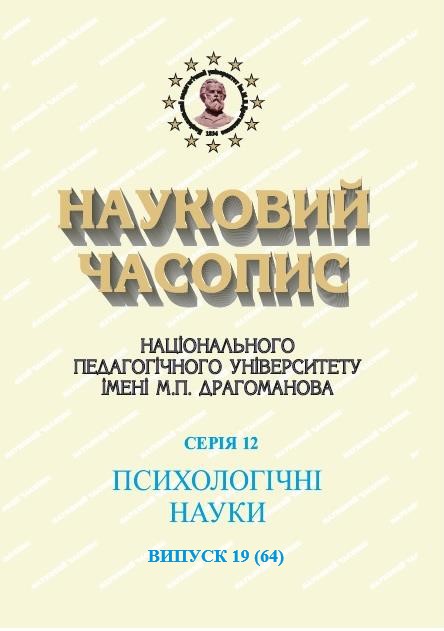THEORETICAL ANALYSIS OF MENTAL OPERATION DEVELOPMENT WITH YOUNGER SCHOOL STUDENTS
DOI:
https://doi.org/10.31392/NPU-nc.series12.2022.19(64).02Keywords:
cognitive process, thinking, thinking operations, analysis, synthesis, comparison, abstraction, generalization, classification, systematization, cognitive development, primary school age.Abstract
The article carries out a theoretical analysis of the research of foreign and domestic scientists on the development of thinking and thinking operations, and also focuses on the peculiarities of their formation in the individual. To date, there are many studies of the specified process, its types, forms and operations. But it is important to realize that social, economic, political or cultural changes in society involve changes in the formation and development of the personality, its cognitive processes, and, therefore, there is a need for their theoretical study and empirical research. The article presents an overview of modern research on the thinking process and the peculiarities of its development in younger schoolchildren. Attention is focused on the peculiarities of the development of their thinking operations, which play an important role in the intellectual activity of students. At the same time, the importance and necessity of the development of cognitive processes of modern junior high school students is substantiated. Primary school students learn to analyze information, find the main thing among different parts and properties of objects. Gradually, analysis is connected with synthesis, thus, the level of analytical and synthetic activity increases, which means gradually delving into the essence of an object or phenomenon, studying all its aspects and properties and combining them for further knowledge. Also, an important component of students’ thinking activity is abstraction, which is related to generalization and concept formation. In the process of educational activity, methods of generalization are gradually being improved and its results are changing. Through classification, students learn to search for common or essential features for a certain group. The ability to systematize and combine subjects or objects into groups will gradually develop. It is noted that the development of thinking operations contributes to the development of the intellectual activity of schoolchildren. It is also emphasized that it is necessary to develop thinking from an early age, since it is at this age that the role of thinking in the activities of younger schoolchildren increases, its varieties and main properties change.
References
- Latysh, N.M. (2019). Psykholohichni aspekty stanovlennya tvorchoho myslennya uchniv molodshoho shkilnoho viku [Psychological aspects of the formation of creative thinking of students of primary school age]. Aktualni problemy psykholohiyi. Zbirnyk naukovykh prats’ Instytutu psykholohiyi imeni H.S. Kostyuka NAPN Ukrayiny – Actual problems of psychology: Collection of scientific works of the G.S. Kostyuk Institute of Psychology of the National Academy of Pedagogical Sciences of Ukraine, XII(26), 148–157.
- Lysyanska, T.M. (2013). Psykholohichne zabezpechennya rozvytku kohnityvnykh protsesiv uchniv molodshoho shkilnoho viku [Psychological support for the development of cognitive processes of students of primary school age]. Naukovyi chasopys Natsionalnoho pedahohichnoho universytetu imeni M.P. Drahomanova Seriia 12. Psykholohichni nauky – Scientific journal of the National Pedagogical Dragomanov University Series 12. Psychological Sciences, 41(65), 142–150. Retrieved from http://enpuir.npu.edu.ua/bitstream/handle/123456789/22815/Lysianska.
pdf?sequence=1 - Lysyanska, T.M. (2014). Funktsiyi ta struktura znan u spryamovanomu myslenni [Functions and structure of knowledge in directed thinking]. Yednist navchannia i naukovykh doslidzhen – holovnyi pryntsyp universytetu : zbirnyk naukovykh prats zvitno-naukovoi konferentsii vykladachiv universytetu za 2013 rik – The unity of education and research is the main principle of the university: a collection of scientific papers of the reporting and scientific conference of university teachers for 2013 (February 4-6, 2014). G.I. Volynka, O.V. Uvarkina,
P. Emelyanova, 143–145. Retrieved from http://enpuir.npu.edu.ua/bitstream/
handle/123456789/6906/Lisyanska.pdf?sequence=1 - Molyako, V.O. (2011). Psykholohichne doslidzhennya tvorchykh pertseptyvnykh protsesiv na riznykh vikovykh rivnyakh. Inshyy [Psychological study of creative perceptual processes at different age levels. Other]. Kirovohrad : Imeks-LTD.
- Tretyak, T.M. (2017). Psykholohichni osoblyvosti myslennyevoyi diyalnosti shkolyariv [Psychological features of the thinking activity of schoolchildren]. Aktualni problemy psykholohiyi: Zbirnyk naukovykh prats Instytutu psykholohiyi imeni H.S. Kostyuka NAPN Ukrayiny – Actual problems of psychology. Collection of scientific works of the G.S. Kostyuk Institute of Psychology of the National Academy of Pedagogical Sciences of Ukraine, XII(23), 312–323.
- Dejonkhir, P.J., Kir, K.V., & Mestdag, N. (2010). Training the Scientific Thinking Circle in Pre- and Primary School Children. The Journal of Educational Research, 103(1), 1–16. https://doi.org/10.1080/00220670903228595
- Klisene, I., Paskovske, A., Chizauskas, G., Augustine, A., Simonaitiene, B., & Kubilyunas, R. (2022). The Impact of Achievements in Mathematics on Cognitive Ability in Primary School. Brain Sciences, 12(6), 1–17. https://doi.org/10.3390/brainsci12060736
- Piaget, (2015). Language and thought of the child. New York : The humanities press, Inc. Retrieved from https://archive.org/details/in.ernet.dli.2015.188629
- Piaget, J. (2020). The origins of intelligence in children. New York : International Universities Press, Inc. Retrieved from https://archive.org/details/originsofintelli0000jean_y5x4
- Parker, R., Thomsen, B.S., & Berry, E. (2022). Learning Through Play at School – A Framework for Policy and Practice. Frontiers in Education. Sec. Teacher Education, 7, 1–12. https://doi.org/10.3389/feduc.2022.751801
- Petrignha, L., Thomas, E., Rizzo, F., & Bellafiore, M. (2022). Does Learning Through Movement Improve Academic Performance in Primary Schoolchildren? A Systematic Review. Frontiers in Education. Sec. Children and Health, 10, 1–13. https://doi.org/10.3389/fped.2022.841582
- Reunamo, V.J., & Ruokonen, I. (2022). Children’s creative thinking abilities and social orientations in Finnish early childhood education and care. Early Child Development and Care, 192(6), 872–886. https://doi.org/10.1080/03004430.2020.1813122

